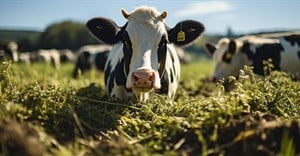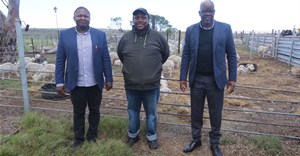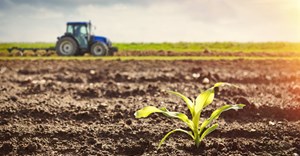Trending



 Does anyone know what content is any more?Justine Drake
Does anyone know what content is any more?Justine Drake

Elections 2024
Covid-19 and the agricultural sector: We dare not waste this crisis
And though the systemic weak links highlighted by the Covid-19 pandemic - politically, economically and socially - aren't new, the grave need for an overhaul has certainly been amplified.

A new leaf
In its ubiquitous call for meaningful change, the pandemic has left no industry exempt. And the playing field has been levelled – albeit only to a point.
In the absence of a response template, the pandemic has thrust the agricultural sector into improvisation mode, whereby real change can only come about through intentional collaboration. The more resilient, globally competitive agricultural sector that we aspire to must be engineered by working together.
And as a legitimate part of the agricultural value chain, smallholder farmers (especially) deserve equity in market share and allocation of resources. Therefore, a critical point of departure for creating a “new agriculture” and "building back better" to effect change is with our farmers. Without them there is no sector.
But, how can farmers effectively harness their position as frontline participants, specifically in the food systems context?
Farmers need to unanimously assert their critical need for structured communication and focused skills development. These are critical empowerment tools for this vulnerable segment of agriculture, to actively engage and advocate for a more rewarding, equitable, sustainable and just agricultural system. How else would farmers ensure fairness in the distribution of risk and reward within the value chains in which they so actively participate?
Smallholder farmers comprise more than 60% of the sub-Saharan population. But a lack of substantial investment in inputs, infrastructure and markets continues to prevent smallholder farmers from participating in productive and commercial agriculture (2019. McKinsey & Co. Winning in Africa’s agricultural market).
The well-intended impact of governments’ recognition of agriculture as an essential service at the start of the pandemic – which came as no surprise, given the economic relevance of the sector – has been buffered somewhat. Though the effects of the pandemic on production are easing relatively, high-value commodities – which are mostly produced by smallholder farmers – have been impacted most severely, because of their perishable nature.
Delays in transportation and resultant shortages in agricultural labour; hampered access to inputs required for the next growing season; a shortage of storage and cold chain facilities; and blockages in the overall flow of goods and services are amongst the challenges that smallholder farmers have endured. In some cases, smallholder farmers have been unable to resume production after such setbacks. These challenges highlight a dire need for investment in backbone infrastructure (e.g. electricity, water, roads, rail and ICTs).
The Food and Agricultural Organisation (FAO) reports that, in the face of the pandemic, some countries like China have promulgated and adopted various financial support measures for smallholder farmers and agricultural micro, small and medium enterprises. And the Italian government issued a decree last year to allocate EUR 100m to support agricultural enterprises related to farming, fishery and aquaculture, to cover the interests of loans and mortgages.
These farmers have also been able to request an advance payment of 70% for the annual non-repayable contributions, instead of the 50% under the Common Agriculture Policy (2020. FAO. Covid-19 and smallholder producers’ access to markets).
Then there’s the support and protection of women, which also deserves scrutiny within the agricultural narrative, to enable them to trade more safely, as well as being able to contribute more significantly to domestic economic development.
A call for digital adoption
The pandemic has certainly sounded a clarion call for governments and the agricultural sector (in particular) to accelerate the adoption of digital technology, in order to not only survive, but also thrive in the changing landscape.
Digital technology enables impact at scale, introducing speed in communication and processing at a relatively lower cost.
The profile of technology has been elevated as a game-changer and leveller, especially when it comes to connectivity and the need for a deeper understanding of the agricultural ecosystem (including transport, banking, mining, manufacturing, construction and other sectors). Of equal importance is the need for real-time data to assess the state of food security and to obtain other agriculturally relevant information (even beyond the pandemic).
Employing digitalisation will certainly accelerate the process of strengthening intraregional trade, and help circumvent non-tariff trade barriers. In fact, a recent report from the Malabo Montpellier Panel rightfully fingered non-tariff measures (including quotas and subsidies) as a major hindrance to intraregional and intracontinental trade (2020. Malabo Mont Pellier Panel. Trading Up: Policy innovations to expand food and agriculture trade in Africa). Eradicating non-tariff measures could serve as an effective mitigator against Africa’s food waste/loss, which currently clocks around 40%.
Digital technology connects large numbers of people through knowledge and influence. It’s a true catalyst for much-needed agricultural transformation. How can we not harness it to initiate meaningful change, improve digital literacy, provide digital infrastructure, ensure farmers’ organisations’ (FOs) access to ICTs, and reduce data cost?
There’s a strong case for the transformative power of digital technologies with regard to agri-food systems in emerging markets. Incorporating digital tools into a national agricultural transformation program could help raise smallholder farmers’ income, increase crop output, and support food security.
Now is the time for agriculture, which has lagged other industries in adopting technology, to demonstrate progressiveness in this arena. Also, “if connectivity is implemented successfully in agriculture, the industry could tack on $500bn in additional value to the global gross domestic product by 2030, according to our research.” To effectively address the challenges currently facing agriculture, the sector “must embrace a digital transformation enabled by connectivity” (2020. McKinsey & Co. Agriculture’s connected future: How technology can yield new growth).
Desperate times
In its Global Economic Prospects report, the World Bank confirms an expected global economic growth of 4% in 2021, stating investment and vaccine deployment as significant caveats for sustained growth. And, though there has been an uptick in global economic growth predictions for the past two years – 2.5% and 2.4% for 2020 and 2019 respectively – pandemic related economic constraints are still sorely felt, especially in emerging economies.
Agriculture in Africa simply cannot continue in its notoriety for (amongst others) restricted ownership of land and capital; limited access to finance and other key resources; inequality within value chains; domination of exports by primary commodities and importation of finished products; an aging population playing out against limited youth integration; and being predominantly subsistent in nature, perpetuating the perception of being a developing sector.
As a start, Africa’s headwinds can only be mitigated with agility, aligned harnessing of resources, focused adoption of digitalisation, and inclusive agricultural policies and collaborations.
Indeed, it would be a shame if the Covid-19 pandemic went down in history as a crisis wasted on agriculture – especially in Africa.









